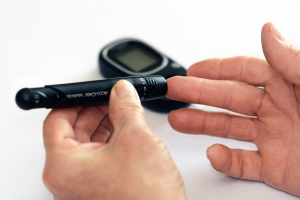
Results from a clinical trial comparing 200 micrograms of selenium supplementation with placebo supplementation show no effect of the selenium supplementation on measures of insulin secretion and insulin action [Jacobs].
These results can be regarded as important evidence that selenium supplementation for up to three years in older individuals has no diabetes causing effects in humans [Jacobs].
The researchers who conducted the selenium and insulin resistance study concluded that the results of the study do not show a causal role for selenium in the development of insulin resistance or in the development of type-2 diabetes [Jacobs].
Research design of the selenium and insulin resistance study
Background: In 2016, researchers at the Arizona Cancer Center in Tucson reported on the results of the Selenium Trial [Thompson].
In that study, researchers enrolled men and women aged 40 to 80 years from endoscopy clinics in Arizona, Colorado, New York, and Texas. They tested the effect of a high-selenium yeast supplement on the prevention of colorectal adenomas and on the risk of associated Type 2 diabetes [Thompson].
For the present study, a study of possible effects of selenium supplementation on the risk of developing diabetes, the researchers selected 400 participants from the bigger Selenium Trial. The 400 participants were randomly assigned to a selenium supplementation group (n = 205) or to a placebo group (n = 195).
There were approximately 1/3 women and 2/3 men among the 400 participants.
The average age of the participants was 63 years plus/minus 8.9 years.
Outcome assessments in the selenium and insulin resistance study
The researchers assessed two primary endpoints:
- beta-cell function using the HOMA2-%β model
- insulin sensitivity using the HOMA2-%S model
The HOMA2 assessments showed the following outcomes:
- No statistically significant differences between the selenium group and the placebo group on either measure (beta-cell function or insulin sensitivity) after 2.9 years of supplementation [Jacobs]
- No statistically significant differences between the selenium group and the placebo group when stratified by age or gender [Jacobs]
Secondary assessment in the selenium and insulin resistance study
To test further the possibility of a link between selenium supplementation and the risk of type-2 diabetes, the researchers drew a convenience sample of 175 participants – 96 participants in the placebo group and 79 participants in the selenium supplementation group.
They administered the modified oral glucose tolerance test (mOGTT test) to these participants.
The oral glucose tolerance test (OGTT) measures the body’s response to sugar.
Accordingly, the OGTT test can be used to screen for type 2 diabetes. The modified version of the OGTT is often used to diagnose gestational diabetes.
Results of the oral glucose tolerance test
Both the selenium group and the placebo group had fasting glucose concentrations, on average, that were within the normal range (= less than 100 mg/dL).
- Selenium group: 92.3 mg/dL (plus/minus 12 mg/dL)
- Placebo group: 96.6 mg/dL (plus/minus 14.6 mg/dL)
Selenium supplementation and the risk of prostate cancer
This study showing no diabetes causing effect of selenium supplementation is an encouraging study. Furthermore, there seems to be no age-related effect of selenium supplementation on insulin sensitivity (Jacobs, figure 4).
This is especially noteworthy because earlier studies seem to show that the best protection of selenium against the development of prostate cancer is found in the serum selenium concentration range from 120 micrograms per liter to 170 micrograms per liter [Hurst].
The results from a 2018 meta-analysis and systematic review indicate that selenium “most probably has a protective role against the development of prostate cancer and its progression to advanced stages.” Accordingly, the authors of the review conclude that “selenium supplementation can be proposed for prevention of prostate cancer” [Sayehmiri].
Sources
Hurst, R., Hooper, L., Norat, T., Lau, R., Aune, D., Greenwood, D. C., & Fairweather-Tait, S. J. (2012). Selenium and prostate cancer: systematic review and meta-analysis. The American Journal of Clinical Nutrition, 96(1), 111-122.
Jacobs, E. T., Lance, P., Mandarino, L. J., Ellis, N. A., Sherry Chow, H-H, … & Thompson, P. A. (2019). Selenium supplementation and insulin resistance in a randomized, clinical trial. BMJ Open Diabetes Research & Care, 7 e000613, doi: 10.1136/bmjdrc-2018-000613
Sayehmiri, K., Azami, M., Mohammadi, Y., Soleymani, A. & Tardeh, Z. (2018). The association between selenium and prostate cancer: a systematic review and meta-analysis. Asian Pac J Cancer Prev, 19 (6), 1431-1437.
Thompson, P. A., Ashbeck, E. L., Roe, D. J., Fales, L., Buckmeier, J., Wang, F., & Lance, P. (2016). Selenium Supplementation for Prevention of Colorectal Adenomas and Risk of Associated Type 2 Diabetes. Journal of The National Cancer Institute, 108(12). https://doi-org.db14.linccweb.org/10.1093/jnci/djw152
The information presented in this review article is not intended as medical advice and should not be construed as such.
